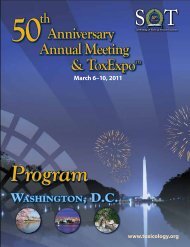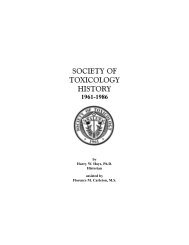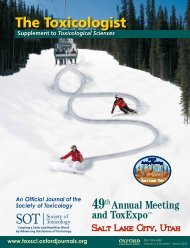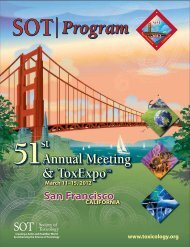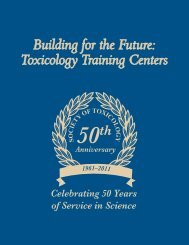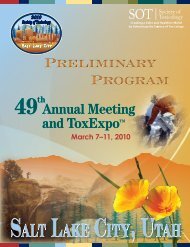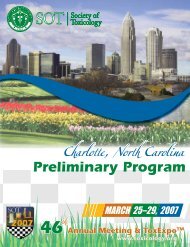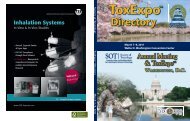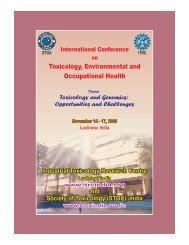51st Annual Meeting & ToxExpo - Society of Toxicology
51st Annual Meeting & ToxExpo - Society of Toxicology
51st Annual Meeting & ToxExpo - Society of Toxicology
Create successful ePaper yourself
Turn your PDF publications into a flip-book with our unique Google optimized e-Paper software.
<strong>Society</strong> <strong>of</strong> <strong>Toxicology</strong> 2012<br />
Scientific<br />
Workshops<br />
The Thematic Track information can be found on pages 8–9.<br />
• Volatile and Particulate Environmental Air Pollutants Impede<br />
VEGF-Mediated EPC Mobilization from Bone Marrow. A<br />
Common Mechanism? Petra Haberzettl, University <strong>of</strong> Louisville,<br />
Louisville, KY.<br />
• Ah Receptor Activation in Mice Alters Hematopoietic Stem/<br />
Progenitor Cell Functions and Gene Modulation Reflecting<br />
Changes in Cellular Trafficking: Implications for Humans<br />
and Hematopoietic Diseases. Thomas Gasiewicz, University <strong>of</strong><br />
Rochester, Rochester, NY.<br />
• Adverse Effects <strong>of</strong> Polycyclic Aromatic Hydrocarbons on Bone<br />
Marrow Progenitor Cells and Its Relationship to Reduced<br />
Cellularity in the Spleen and Thymus. Charles Czuprynski,<br />
University <strong>of</strong> Wisconsin, Madison, WI.<br />
T-Dependent Antibody Responses in Nonhuman<br />
Primates: Challenges and Opportunities<br />
Wednesday, March 14, 1:30 PM to 4:15 PM<br />
Chairperson(s): Jacintha Shenton, MedImmune Ltd., Granta Park,<br />
Cambridge, United Kingdom, and Hervé Lebrec, Amgen Inc.,<br />
Seattle, WA.<br />
Sponsor:<br />
Immunotoxicology Specialty Section<br />
Endorsed by:<br />
Biotechnology Specialty Section<br />
Regulatory and Safety Evaluation Specialty Section<br />
Increasingly, the T-cell dependent antibody response (TDAR) assay<br />
is used as a means to evaluate immunomodulation—immunopharmacology<br />
or immunotoxicology—in nonhuman primates (NHPs).<br />
This is primarily due to the plethora <strong>of</strong> immunomodulatory biopharmaceuticals<br />
in development. Our focus will be on several key topics<br />
relevant to the TDAR and other measures <strong>of</strong> immune responses to<br />
T-dependent (TD) antigens. Traditionally, the TDAR has been used as<br />
a means to evaluate immunosuppression. It is less clear whether it is<br />
possible or appropriate to use the TDAR to evaluate immunostimulation.<br />
In addition, although the read-out <strong>of</strong> the TDAR is by definition<br />
the generation <strong>of</strong> antigen-specific antibodies, T-helper cells, as well<br />
as antigen presenting cells, are also involved in the response, while<br />
poorly characterized in the context <strong>of</strong> this assay in NHPs. There is, for<br />
instance, little information on T-cell differentiation towards T-helper<br />
[Th]1 versus Th2 responses in this context. Cellular immune responses<br />
to TD antigens may also be evaluated using the delayed-type hypersensitivity<br />
(DTH) response; however, DTH is notoriously difficult to<br />
produce in NHPs and correlative data between the systemic and local<br />
responses to the TD antigen are lacking. Although immune responses<br />
to TD antigens are routinely evaluated nonclinically there is little<br />
understanding <strong>of</strong> translational data across species and to humans.<br />
Furthermore, the increased use <strong>of</strong> the TDAR in NHPs is associated<br />
with a disparity <strong>of</strong> protocols as well as methods for data interpretation;<br />
any discussions on standardization/best practices generally<br />
result in significant debate. The goal <strong>of</strong> this session is to share data<br />
and progress in our understanding <strong>of</strong> the measurable endpoints <strong>of</strong> the<br />
immune response to TD antigens and to provide a forum for discussion<br />
on the utility <strong>of</strong> these endpoints within drug development.<br />
• Use <strong>of</strong> the T Cell-Dependent Antibody Response to Evaluate<br />
Immunostimulation. Jacques Descotes, Poison Center and<br />
Pharmacovigilance Department, Lyon, France.<br />
• Beyond Antibodies: Characterization <strong>of</strong> the Cellular Immune<br />
Response to Keyhole Limpet Hemocyanin. Lynne LeSauteur,<br />
Charles River, Montréal, Québec, Canada.<br />
• Correlations between Systemic and Local Responses to<br />
T-Dependent Antigens. Margreet Jonker, Biomedical Primate<br />
Research Centre, Rijswijk, Netherlands.<br />
• Translation <strong>of</strong> the Immune Responses to T-Dependent Antigens<br />
between Nonhuman Primates and Humans. Jacintha Shenton,<br />
MedImmune, Cambridge, United Kingdom.<br />
• Good Practices in the Study Design, Data Analysis, and<br />
Reporting <strong>of</strong> T-Dependent Antibody Response Studies.<br />
Hervé Lebrec, Amgen, Inc., Seattle, WA.<br />
Thursday<br />
Regulatory Science: Bridging the<br />
Gap between Discovery and Product<br />
Availability<br />
Challenges and Opportunities in Evaluating<br />
Protein Allergenicity across Biotechnology<br />
Industries<br />
Thursday, March 15, 9:00 AM to 11:45 AM<br />
Chairperson(s): Nicola Stagg, Dow AgroSciences LLC, Indianapolis,<br />
IN, and Hanan Ghantous, US FDA, Silver Spring, MD.<br />
Sponsor:<br />
Biotechnology Specialty Section<br />
Endorsed by:<br />
Food Safety Specialty Section<br />
Immunotoxicology Specialty Section<br />
Biotechnology is a field at the cutting-edge <strong>of</strong> science, using living<br />
cells and materials produced by cells to prevent and fight disease,<br />
improve food production, and benefit other industries as well, but<br />
there are increasing concerns over the allergenicity <strong>of</strong> biotechnology<br />
products that continue to receive increasing attention in public and<br />
regulatory domains. These concerns range from the transfer <strong>of</strong><br />
an existing allergen or cross-reactive protein into another crop or<br />
increasing endogenous (existing) allergens in crops to accidental<br />
Thematic Session<br />
98<br />
SOT’s 51 st <strong>Annual</strong> <strong>Meeting</strong>



